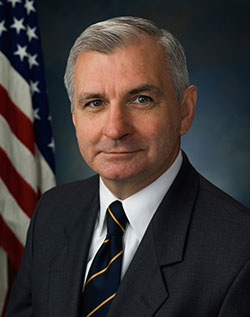U.S. Sen. Jack Reed to Deliver Commencement Address at RWU
Civil rights leader Clifford R. Montiero and RWU Trustee Marcia Morris will receive honorary degrees during May 18 ceremony. On May 17, RWU Law graduates will hear from Professor Lee Epstein, leading scholar in judicial decision-making

BRISTOL, R.I. – U.S. Senator Jack Reed will deliver the commencement address to more than 1,200 students during the Roger Williams University undergraduate commencement ceremony on Saturday, May 18, 2019.
During the ceremony, RWU will present honorary degrees to civil rights leader Clifford R. Montiero, who marched with the Rev. Martin Luther King Jr. and served as president of the NAACP Providence branch for a decade, and to Marcia Morris, Vice Chair of the RWU Board of Trustees and a Presidential Search Committee co-chair who served in executive management and chief legal officer roles during her career.
A day earlier, on Friday, May 17, the RWU School of Law will hold a commencement ceremony for 130 students, as the state’s only law school celebrates its 25th year. One of the leading scholars in judicial decision-making, Professor Lee Epstein of Washington University in St. Louis, will deliver the commencement address and receive an honorary degree. Former Rhode Island Department of Corrections Director A.T. Wall II and Rhode Island trial lawyer Peter A. DiBiase also will receive honorary degrees from the law school.
Later in the day, on Friday, May 17, 150 students will take part in RWU’s graduate commencement ceremony. They will hear from Rebekah Snyder, who received a master’s degree in forensic psychology from RWU in 2016 and who served as the victim advocate for the Michigan attorney general’s office in the sexual abuse case involving USA Gymnastics doctor Larry Nassar.

“Senator Reed’s career and ideals are closely aligned with the core purpose of RWU: To serve society through engaged teaching and learning,” RWU Interim President Andy Workman said. “Senator Reed offers the graduating students an inspirational example of a life of public service. His career demonstrates the power of higher education to advance not just himself but the lives of all his fellow Rhode Islanders. He truly exemplifies the core values of the state’s founder and our namesake, Roger Williams.”
As Rhode Island’s senior U.S. senator, Reed is a senior member of the powerful Senate Appropriations Committee, and he has helped secure millions of dollars in federal funding to enhance the university's research capacity and support programs such as the Center for Economic and Environmental Development. He is also the Ranking Member on the Senate Armed Services Committee.
Reed graduated from the U.S. Military Academy at West Point (B.S., ’71), Harvard University’s Kennedy School of Government (M.P.P., ’73) and Harvard Law School (J.D., ’82). He received an Honorary Doctor of Public Service from Roger Williams University in 2009.
Reed served in the 82nd Airborne Division as an Infantry Platoon Leader, a Company Commander, and a Battalion Staff Officer. He was also a member of the faculty at West Point as an Associate Professor in the Department of Social Sciences.
After completing his active duty military service and working as an attorney in private practice, Reed serves three terms in the Rhode Island Senate before winning election to the U.S. House of Representatives in 1990, followed by his election to the U.S. Senate in 1996. Time magazine has called Reed “a serious, intellectually honest veteran and an expert on defense issues in the Senate,” and The New York Times has described him as “a quiet dealmaker respected by colleagues in both parties.”
Montiero has been one of Rhode Island’s foremost civil rights advocates for decades. Born in 1937 in Providence, he attended the University of Rhode Island and took classes at what was then Roger Williams College. He became a leader in the Rhode Island chapter of the old Congress of Racial Equality. He registered Southern sharecroppers to vote. He staged sleep-ins, marches and rallies at the Rhode Island State House to press for fair housing laws, and he pushed for diversity in the state judiciary and law enforcement agencies.
In 1963, Montiero participated in the March on Washington for Jobs and Freedom. In 1965, he marched over the Edmund Pettus Bridge in Selma, Ala., with MLK as part of an effort to register black voters in the South. In the face of threats, violence and virulent racism, he handled communications and provided security as voting-rights advocates marched 54 miles from Selma to Montgomery, where MLK delivered his “How Long, Not Long” speech.
Montiero served as president of the Providence branch of the National Association for the Advancement of Colored People for a decade. In 2015, he returned to Selma and stepped onto the Edmund Pettus Bridge 50 years to the day that he marched there with MLK. “We know the march is not over,” he said. “There are more bridges to cross.”
Morris has served on the Board of Trustees of Roger Williams University since 2009, as a Vice Chair of the Board since 2016, as Chair of the Recruitment, Retention and Student Life Committee since 2010, and as Chair of the Campaign for Civic Scholars since 2016. She served as a co-chair of the Presidential Search Committee, which played a key role in the selection of Ioannis (Yannis) Miaoulis as RWU’s President-Designate.
Morris served as the first General Counsel for The Stride Rite Corporation from 1983 to 1992, and for the last three of those years as the President of the Stride Rite Children’s Wholesale Division. In 1994, she joined The Presbyterian Hospital in the City of New York as its Chief Legal Officer and Senior Vice President for Strategy, and after merging that enterprise with New York Hospital, she served in those same roles for New York Presbyterian Hospital until 2000. Over the ensuing 16 years, she served in a strategic consulting capacity for The College Board, as Vice President of Government Affairs and Corporate Relations for Praecis Pharmaceuticals Corporation, and in an Of Counsel capacity for The Center for Applied Research.
Morris received a Bachelor of Arts degree from Connecticut College, a law degree from Boston University School of Law, and a Master of Public Administration from The Kennedy School at Harvard University.

Lee Epstein is the Ethan A.H. Shepley Distinguished University Professor at Washington University in St. Louis. Her research and teaching interests center on law and legal institutions, especially the behavior of judges. She is a Fellow of the American Academy of Arts and Sciences and the American Academy of Political and Social Science. She also serves as Co-Director of the Center for Empirical Research in the Law, Lecturer in Law at the University of Chicago, and a Principal Investigator of the U.S. Supreme Court Database project. A recipient of 12 grants from the National Science Foundation, Professor Epstein has authored or co-authored more than 130 articles and essays and 18 books, including “The Choices Justices Make.”
“Lee Epstein is a rare academic,” RWU Law Dean Michael J. Yelnosky said. “Her research has been remarkably influential. She has changed our understanding of the factors that influence judicial behavior. But there is more. Her use of empirical methods to reveal those factors was on the leading edge of a revolution in the use of empirical methods in American law schools, a practice that has now become mainstream. And although those accomplishments are worthy of honoring at our commencement exercises, there is even more. She is an entertaining speaker – her enthusiasm for her subject is palpable, her insights are keen, and she is precise and witty. I look forward to having her with us as we celebrate the accomplishments and the promise of the members of the Class of 2019.”
A.T. Wall was the long-time director of the Rhode Island Department of Corrections (his 18 years in that role made him the longest-serving corrections director in the United States). He retired in 2018. His work in the corrections field began in 1976, when he served as a line probation officer in New Haven, Conn. After graduating from Yale Law School, he worked in the New York District Attorney’s office and the Vera Institute of Justice before joining the Rhode Island Department of Corrections, where he spent the remainder of his career. A champion for innovations in the field, he set policy direction and oversaw institutions with some 13,000 pretrial and sentenced admissions a year.
Peter A. DiBiase, Esq., is one of the preeminent trial lawyers in Rhode Island. His 54-year legal career began at the Rhode Island Public Defender’s Office as a summer clerk. After his graduation from law school, he was hired as an Assistant Public Defender and served as the Rhode Island Mental Health Advocate. He served with distinction in both positions, clearly demonstrating his commitment to public service. Upon leaving the Public Defender’s Office, Peter went into private practice. He has served as a member of the Supreme Court Disciplinary Board, the Supreme Court’s Committee on Character and Fitness, and the Judicial Tenure Commission. He received the Rhode Island Bar Association’s 2016 Ralph P. Semonoff Award for Professionalism.
The undergraduate commencement ceremony will take place on Saturday, May 18, under the tent on the main athletic field of RWU’s Bristol campus. The processional steps off at 9 a.m., and the ceremony begins at 10 a.m.
The law school commencement ceremony will take place on Friday, May 17, under the tent on the main athletic field. The processional steps off at 12:20 p.m., and the ceremony begins at 12:30 p.m.
The graduate commencement ceremony will take place on Friday, May 17, under the tent on the main athletic field. The processional steps off at 3:30 p.m., and the ceremony begins at 4 p.m.
For commencement details, go to: https://www.rwu.edu/academics/commencement.